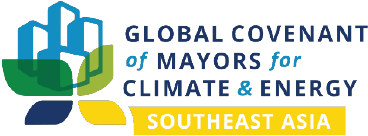7 November 2022 | As the Secretariat of the Global Covenant of Mayors for Climate and Energy (GCoM) Southeast Asia, UCLG ASPAC mobilised speakers from three SEA countries to participate at the InfoPoint Conference, “Strengthening Asian Cities’ Capacity for Robust Climate Action Planning.” They were Mayor Edi Rusdi Kamtono (Pontianak, Indonesia), Safwan Shari (Iskandar Puteri, Malaysia), and Nguyen Sy Linh (ISPONRE, Vietnam) as the beneficiaries of the GCoM Asia Project.
The GCoM Asia Project (2021-2023) funded by the European Union (EU) aims to provide support to eight countries in Asia in mobilising resources to plan and implement sustainable energy and climate action at the local levels. The project recently received the opportunity from the European Commission to convey the progress of the project implementation at the InfoPoint Conference. The project team members and beneficiaries, including pilot cities and technical partners, attended the event in person at the European Commission Office in Brussels and virtually via WebEx.
The event began with a brief explanation from Michel Mouchiroud of the EU Foreign Policy Instrument (FPI). He shared what the GCoM is and how it is correlated with the EU priorities, particularly in Asia. He highlighted four points of the GCoM Asia Project activities: (1) development of a climate action plan, (2) capacity building, (3) vertical integration between national and local government, and (4) validation through the badge system.
Asih Budiati, the GCoM Asia Project Team Leader, elaborated further on how the project has benefitted cities and local governments across Asia. Through capacity-building activities, the project has provided training on climate change mitigation and adaptation to more than 500 city officials. Through its knowledge-sharing events, the GCoM Asia Project has also reached out to more than 2,500 people considering gender-balanced participation.
Speaking on behalf of Indonesia was the Mayor of Pontianak Edi Rusdi Kamtono himself. He shared the experience of Pontianak City in developing a Climate Action Plan (CAP) and the future arrangement to mainstream it into local development plans. “Being more environmentally friendly has become one of the visions of Pontianak. Therefore, CAP has been and will continually be mainstreamed into the Development Plan of Pontianak,” he remarked.
From Malaysia, Safwan Shaari of the Iskandar Puteri City Council shared that the city has received a series of training on Greenhouse Gas Inventory (GHGI) and Climate Risk and Vulnerability Assessment (CRVA) provided by the Universiti Teknologi Malaysia (UTM) as the GCoM Asia Project’s technical partner. He highlighted how the training has been very beneficial for the officials and the city in general.
Vietnam was represented by Nguyen Sy Linh as the Head of the Climate Change Division at the Institute of Strategy and Policy on Natural Resources and Environment (ISPONRE). Under the GCoM Asia Project, ISPONRE is one of the technical partners that assist pilot cities in developing CAP, apart from CDP. Linh shared the challenges faced by Vietnamese cities in developing CAP, including enabling environment, the capacity of officials, and budgeting.
Besides three Southeast Asian countries (Indonesia, Malaysia, and Vietnam), there were two other speakers from East Asia and South Asia: Mayor Toma Yamazoe (Mayor of Yosano, Japan) and Ravi Guru (Deputy Director General, All India Institute of Local Self Government or AIILSG).
—
Written and reviewed by: Rona Ikram Putri










